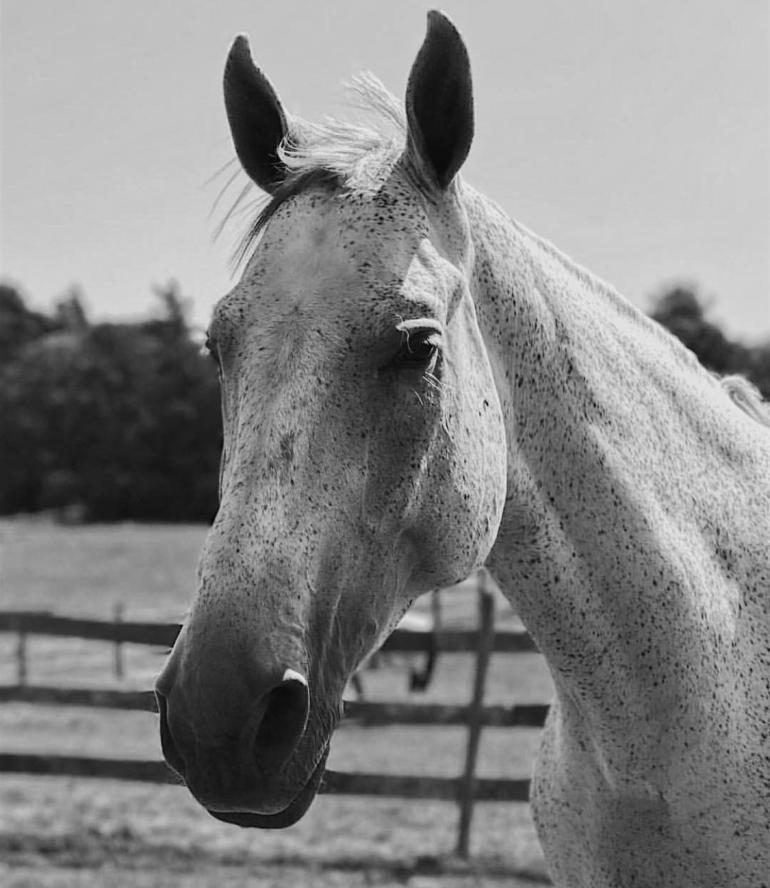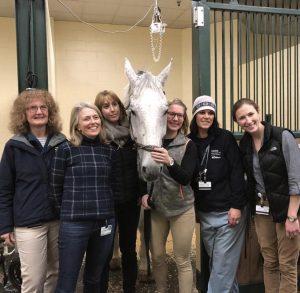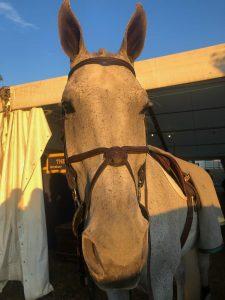-
About
- Leadership & Faculty
- News & Events
-
Admissions
-
Academics
- Graduate
- Advanced Clinical Training
- Continuing Education
- Academic Departments
- Academic Offices
- Simulation Experiences
-
Student Life
- Offices
-
Research
-
- Transformative Research
- Centers & Shared Resources
-
-
Hospitals & Clinics
- Emergency Care
- Hospital Services
-
Community Outreach
- Volunteer
Against All Odds – Clinician’s Expertise Saves Equitation Star
Last Thanksgiving, Conan, an 18.3-hand Argentinian warmblood, within hours went from being healthy and sound to being on the verge of death.

Over the past six years, 18-year-old Emma Fletcher and her Argentinian warmblood, Conan, have grown together from being relatively inexperienced youngsters to accomplished
competitors. “Conan is pretty much the epitome of my riding career,” says Emma. “He helped me learn how to ride like I think no other horse could.”
The pair has been competing in Big Equitation for three years together. In the fall of 2018, they claimed Top 25 at the ASPCA Maclay Finals, twelfth place at the USEF Hunter Seat Medal Finals, and first place at the New England Equitation Championships.
But that Thanksgiving, Emma got a phone call from her barn manager—Conan was acting colicky. “I dashed home because he’s like my child,” says Emma.
Though Conan had a high temperature, tests came back clear. Still, Emma felt uneasy and decided to bring him to Tufts Equine Center.
Within an hour of arriving, his condition plummeted. “His heart rate was high and his mucous membranes were bright red. He was quite dehydrated,” explains Dr. Melissa Mazan, V93, a board-certified specialist in large animal internal medicine and longtime clinician at Tufts Equine Center. “At the time of admission, we did an ultrasound of the abdomen, and you could see that he had quite a bit of abnormally fluid-filled small and large intestine—what we term enterocolitis, which is a severe inflammatory condition.”
To make matters worse, all Conan’s tests came back negative, including for clostridial infections, which are caused by an imbalance of harmful bacteria commonly found in the GI tract. But Dr. Mazan and her team relied on their knowledge and expertise to determine the best course of action. “His clinical signs, the severity of his illness, and the ghastly reflux made us really suspect a clostridial disease,” she says.
Because horses cannot vomit, they must be “refluxed”—or have fluid physically removed from their stomachs—if the intestines cannot absorb the fluid naturally produced in them every day. At 18.3 hands and almost 1,600lbs, the Argentinian warmblood produced far more reflux than the average-sized horse. This meant the team needed to remove excess fluid from his stomach every two hours and, in exchange, give him up to 200 liters of fluid intravenously every day while monitoring and controlling his electrolytes.
Dr. Mazan talked with Emma and her mother, Kathy, several times a day and, together, they decided to move forward with treatment for a suspected clostridial infection. “They let us know everything they were going to do, and we trusted Tufts Equine Center enough to give them the discretion to do what they needed to do to save him,” says Emma.
Conan was treated with medications to help his GI tract heal and guard against further damage, as well as cryotherapy (icing of the feet and legs) to avoid laminitis, the bane of critically ill horses. Because Dr. Mazan suspected that Conan had a disturbed gastrointestinal bacterial population due to a clostridial infection, Conan also was given multiple fecal transplants—infusions of dilute fresh manure from screened healthy donor horses—through the same nasogastric tube that was used to relieve him of the excess gastrointestinal fluid.
This last treatment is the subject of research by Dr. Caroline McKinney, V16, MPH16, a senior resident in large animal internal medicine, her main advisor Dr. Daniela Bedenice, and Dr. Mazan. “One of the advantages of being at an academic hospital-like Tufts is that we are also able to benefit from working with Dr. Giovanni Widmer, a researcher and a world expert in the microbiome, or the microbial universe of the inside of the intestines,” says Dr. Mazan.
Slowly but surely, the treatment began to work. Dr. Mazan says that the most important factor in Conan’s survival was teamwork—the around-the-clock care that Conan received from the veterinary technicians, house officers, and students. “It really does take a village to save a horse as sick as Conan,” says Dr. Mazan.
By the time all was said and done, Conan had spent more than two weeks at the hospital, lost a significant amount of weight, and wasn’t able to eat hay. But he was alive.
“Because my riding career has been based on my love for the horse, almost losing my partner was just detrimental,” says Emma. “There were no expectations besides hoping that he lived.”
Conan had other plans, however. After returning home, he rehabbed slowly and carefully under the watch of his primary care veterinarian, Dr. Mark Holman. He started walking under saddle and continually progressed over time. Conan took everyone by surprise when he was able to begin jumping cross rails again.
“A month later, we walked into The Devon Horse Show together,” says Emma. “He made a full recovery.”
As a final tribute to their Junior career together, Emma and Conan qualified for the 2019 Maclay Finals, where they claimed fourth place overall. Against all odds, Conan is thriving. “I don’t know if anyone else would have been able to save him the way that Dr. Mazan and Tufts Equine Center did,” says Emma. “And not only save him but set him on the path to recovery.”



